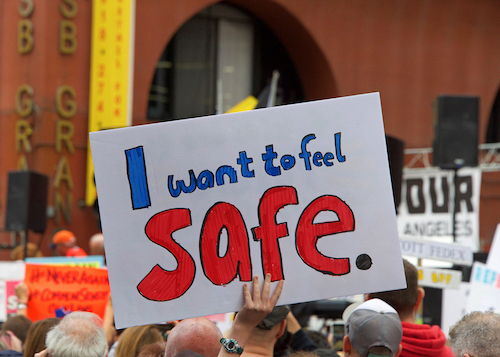 It has been just over a year since a gunman opened fire at Marjory Stoneman Douglas Highschool in Parkland, Florida.
It has been just over a year since a gunman opened fire at Marjory Stoneman Douglas Highschool in Parkland, Florida.
On that day 17 people were killed and 17 more injured.
In the last few weeks, three suicides have brought into focus the impact of such atrocities on the victims left behind.
On March 17 Sydney Aiello, who was a senior at the time of the Parkland shooting, died. Her mother told media her daughter had been suffering from post-traumatic stress disorder and survivor’s guilt since the shooting.
Just a week later, another student from Marjory Stoneman Douglas, a sophomore, was found dead by an apparent suicide.
And Jeremy Richman, a father who lost his daughter Avielle in the Sandy Hook Elementary School shooting in which 20 first grade students and six adults were killed, was found dead earlier this week from a suspected suicide.
The suicides have left the communities of both Parkland and Newtown, Connecticut grieving for a second time, in what experts say may have been a case of survivor’s guilt.
“(Survivor’s guilt) is a set of symptoms that people experience when they have survived a life-threatening situation and other people did not. It is commonly experienced by people who survive things like mass shootings, airplane crashes, rape, terrorism, combat, and death of a loved one including to suicide. It is also seen in people who have lived through natural disasters such as earthquakes, fires, tornadoes, and floods. It was first identified in people who survived the Holocaust. Survivor’s guilt is no longer a formal psychiatric diagnosis but is a component of PTSD,” Nadine Kaslow, PhD, former President of the American Psychological Association and Professor and chief psychologist at Emory University School of Medicine told Theravive.
“Survivor’s guilt may have a short-term or a lasting impact on people’s psychological well-being. It is particularly concerning when it significantly impacts a person’s ability to function or when someone has significant doubts about the meaning and purpose of their life,” she said.
Potential signs of survivor’s guilt include a person holding a belief they could or should have done things differently, even if they were not at fault, thinking they should have died instead of other people, sleep problems, flashbacks to the traumatic event, lacking motivation, irritability, feelings of helplessness or intense fear, as well as a range of physical symptoms like headaches or stomach aches, and suicidal thoughts. The symptoms can vary among survivors and can be present or intensify at different times.
After the Parkland shooting, at least one teacher expressed concern that students weren’t given enough mental health support in the wake of the tragedy.
Experts say the right kind of support differs for everybody, and schools and other institutions should ensure a variety of help is available.
“Some people will be helped by talking about the tragedy and their feelings. Others will find it painful to relive the experience. Some people will feel comfortable talking to a mental health professional, while others may be put off by the stigma of mental illness. Some people will feel more comfortable talking to a clergy-person or a friend or a family member. Finally, people's need for help and willingness to accept it will vary over time. All that institutions can do is to try to create as many avenues toward help as possible, and to make it easy, confidential, and user-friendly to get help when it is wanted,” Joel A. Dvoskin, PhD, a licensed clinical psychologist at the University of Arizona College of Medicine, told Theravive.
With the recent suicides occurring so close together, many have questioned whether the victims were influenced by the deaths of others. Kaslow says this is a possibility in cases like this.
“The three tragic deaths in close succession was extremely disturbing and upsetting. While not talking about death by suicide is not healthy and leads to bad outcomes, there is also evidence of what is called suicide contagion, especially among young people,” she said.
Kaslow says in the aftermath of a tragic and traumatic event like a shooting it is important those who survived feel a connection to their community. Memorial events are an important part of this process. The healing process following a traumatic event comes in three stages and requires different kinds of support. In the acute phase immediately following the incident, Kaslow says survivors need resources like psychological first aid, in the intermediate phase in the days and weeks afterwards, survivors need mental health care and information sharing so they can regain a sense of empowerment and control.
In the long-term stage, the phase in which the people who recently died were in, support needs vary but are extremely important.
“In the long-term phase, many people will just need intermittent mental health support or no support at all. However, others may need more intensive mental health interventions or substance abuse treatment,” Kaslow told Theravive.
“People in the community need to check in with survivors of tragedy periodically to see how they are doing, even years after an event has occurred, because these individuals, no matter how resilient they are will suffer from their losses for the rest of their life.”
Elizabeth Pratt is a medical journalist and producer. Her work has appeared on Healthline, The Huffington Post, Fox News, The Australian Broadcasting Corporation, The Sydney Morning Herald, News.com.au, Escape, The Cusp and Skyscanner. You can read more of her articles here. Or learn more about Elizabeth and contact her via her LinkedIn and Twitter profiles.